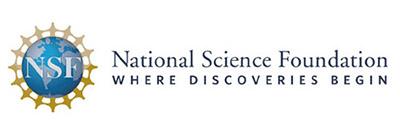

NSF encourages the use of supplement request mechanisms to engage underrepresented minorities, veterans, high school and undergraduate students, K-12 science teachers, develop international collaboration, and consider career-life balance. Supplements can be made under an existing NSF award or within a proposal for a new or renewal NSF award. The Principal Investigator should consult with the Program Director of his/her particular NSF award.
Some of the more common mechanisms include:
Research Experiences for Undergraduates (REU)
To support undergraduate students to participate in research.
REU typically provides support for 1 or 2 undergraduate students to participate in research. Centers or large research efforts may request support for a number of students commensurate with the size and nature of the project.
REU Supplements are supported by the various research programs including the Small Business Innovation Research (SBIR). Some programs have specific conditions.
The request may be submitted either as: 1) A component of a new or renewal research proposal to NSF, 2) A post-award request for supplemental funding on an existing NSF research award.
- guidance from Biological Infrastructure (DBI ) - requests should be made by Feb 1 for optimal consideration
- guidance from Environmental Biology (DEB ) - Target date 3 rd Tuesday in January annually
- guidance from Integrative Organismal Systems (IOS ) - Target date March 1 annually
- guidance from Molecular and Cellular Biosciences (MCB) - Jan 15 annual deadline
- Guidance from Civil, Mechanical and Manufacturing Innovation (CMMI) - to be submitted between Oct. 1 and May 1
- Guidance from Electrical, Communications, and Cyber Systems (ECCS) - to be submitted between Oct. 1 and April 1
Tips to Submit REU an REU proposal for supplemental funding:
Research Experience for Teachers (RET)
To facilitate professional development of K-12 science teachers through research experience at the cutting edge of science
NSF is particularly interested in encouraging its researchers to build mutually rewarding partnerships with teachers at inner city schools and less well-endowed school districts.
- DCL in Biological Sciences
- DLC in Geosciences
- RET in Computer Science & Engineering
to encourage talented high school students who are members of groups traditionally underrepresented in US science to participate in NSF-supported research projects.
meant to encourage talented high school students who are members of minority groups traditionally underrepresented in US science to participate in NSF-supported research projects.
Non-Academic Research Internships for Graduate Students (INTERN)
to provide graduate students with experiential learning opportunities through research internships in non-academic setting
Supplemental funding open to any graduate student with NSF funding ( GRFP or through a PI with active research funding) with experiential learning opportunities through research internships in non-academic setting to acquire core professional competencies and skills to support careers in any sector of the U.S. economy. (ex, industry labs, start-up business, national labs, museums, policy think tanks, non-profit org.)
- DCL: Non- Academic Research Internships for Graduate Students (INTERN): special guidance for CISE, MPS and OIA
Veterans Research Supplement (VRS) Program
to engage veterans in engineering research by providing supplements to active awards in the specific Directorate for Engineering (ENG) Divisions/Offices. OU has projects funded only by
- DCL for VRS in Engineering: geared towards awards funded through CBET, CMMI ECCS, EFMA, EEC and IIP
- DCL for GEO-VETS in Geosciences
GOALI: Grant Opportunities for Academic Liaison with Industry
Funding requested in conjunction with a regular proposal submitted to a standing National Science Foundation (NSF) program or as a supplemental funding request to an existing NSF-funded award for collaborative research projects with industry.
Proposals must be submitted to an active NSF funding opportunity and must be submitted in accordance with the deadlines specified therein. A proposer interested in submitting a GOALI proposal or a GOALI supplemental funding request to an existing NSF-funded award must contact the cognizant NSF Program Officer listed in the relevant funding opportunity prior to submission. Special interest is focused on affording opportunities for:
- Interdisciplinary university-industry teams to conduct collaborative research projects, in which the industry research participant provides critical research expertise, without which the likelihood for success of the project would be diminished;
- Faculty, postdoctoral fellows, and students to conduct research and gain experience in an industrial setting; and
- Industrial scientists and engineers to bring industry's perspective and integrative skills to academe.
to help researchers, who are confronted with a short-term increase in dependent care responsibilities, ensure that the research activities supported by an NSF award can continue
STEM Engagement and Access (PWD-SEA)
to help researchers, who are confronted with a short-term increase in dependent care responsibilities, ensure that the research activities supported by an NSF award can continue.
DCL encouraging submission of new proposals, or requests for supplemental funding to existing awards, to support existing or new access to and engagement in STEM learning, research, and workforce development at proposing or awardee organizations for students, postdoctoral scholars, or faculty and staff with disabilities. Supplemental funding requests to existing awards may also request support for the inclusion of persons with disabilities as participants. Non-exclusive list of participating programs include:
- Discovery Research K-12
- CAREER
- Robert Noyce Scholarship Program
- Improving Undergraduate STEM Education: Education and Human Resources (IUSE: EHR)
- NRT
FASED: Facilitation Awards for Scientists and Engineers with Disabilities
to support access to and engagement in STEM learning, research, and workforce development for students, postdoctoral scholars, or faculty and staff with disabilities.
Individuals with disabilities eligible for facilitation awards include principal investigators, other senior project personnel, and graduate and undergraduate students. The cognizant NSF Program Officer will make decisions regarding what constitutes appropriate support on a case-by-case basis. The specific nature, purpose, and need for equipment or assistance should be described in sufficient detail in the proposal to permit evaluation by knowledgeable reviewers.
NSF SBIR and STTR Phase II Diversity Supplements
Broad number of supplements only available to phase II awardees.
